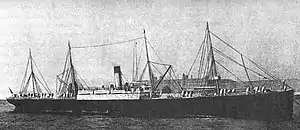SS Naronic
SS Naronic was a steamship built by Harland and Wolff in Belfast for the White Star Line. The ship was lost at sea after leaving Liverpool on February 11, 1893 bound for New York, with the loss of all 74 people on board. The ship's fate is a mystery that remains unsolved to this day.
 The SS Bovic, sister ship of the SS Naronic | |
| History | |
|---|---|
| Name: | Naronic |
| Owner: | White Star Line |
| Builder: | Harland and Wolff, Belfast |
| Yard number: | 251 |
| Launched: | 26 May 1892 |
| Completed: | 11 July 1892 |
| Maiden voyage: | 15 July 1892 |
| Fate: | Disappeared after 11 February 1893 |
| General characteristics | |
| Tonnage: | 6594 GRT |
| Length: | 470 ft (143.3 m) |
| Propulsion: | Twin reciprocating engines, twin propellers |
| Speed: | 13 knots (24.1 km/h) |
| Crew: | 50 |
History
Naronic was launched on May 26, 1892, completed on 11 July 1892[1] and departed for her maiden voyage on 15 July 1892, sailing from Liverpool to New York. The 470 ft, twin screw steamship was designed as a freighter with the addition of limited passenger quarters to handle the increased traffic that White Star was experiencing on its non-New York routes. After her first run, Naronic made five more sailings without incident, before departing on what was to be her final voyage on February 11, 1893 under the command of Captain William Roberts.
Disappearance
For this voyage to New York, Naronic had a crew of 50, plus 24 cattlemen to attend to the ship's primary cargo, livestock. After leaving Liverpool, she stopped briefly at Point Lynas, Anglesey, North Wales, to put her pilot ashore before heading west into heavy seas, never to be seen again.
Naronic had no wireless telegraph with which to send a distress call (it would be another five years before the Marconi Company opened their factory that produced the system the RMS Titanic used to send her distress signals), so whatever problem she encountered, her crew was on their own. The only knowledge we have of the incident comes from two sources.
The British steamer SS Coventry reported seeing two of Naronic's empty lifeboats; the first lifeboat, found at 2:00 am on 4 March, was capsized and the second, found at 2:00 pm, was swamped. The first of these was found 19 miles (some sources put this at 90 miles) from the site where the White Star Line's Titanic would later meet a similar fate.
The second source of information are four bottles with messages inside, which were recovered later, that claimed to have been written while Naronic was sinking. Two of the bottles were found in the United States, one on March 3 in Bay Ridge, Brooklyn, New York, and one in Ocean View, Virginia, on March 30. A third bottle was found in June 1893 in the Irish Channel, and the fourth was found on September 18 in the River Mersey near the ship's point of departure, Liverpool. While all four specifically mention Naronic sinking, the second bottle found contained the most detailed message:
3:10 AM Feb.19. SS Naronic at sea. To who picks this up: report when you find this to our agents if not heard of before, that our ship is sinking fast beneath the waves. It's such a storm that we can never live in the small boats. One boat has already gone with her human cargo below. God let all of us live through this. We were struck by an iceberg in a blinding snowstorm and floated two hours. Now it 3:20 AM by my watch and the great ship is dead level with the sea. Report to the agents at Broadway, New New York, M. Kersey & Company. Goodby all.
It was signed "John Olsen, Cattleman"; however, there was no one with this name listed on the ship's manifest, the closest being John O'Hara and John Watson. A similar situation exists with the first bottle found, in that the signature, "L. Winsel", is also not on the manifest. The messages in the other two bottles are unsigned. Because of this, the reliability of the bottles as genuine testaments to the ship's fate has been questioned and the Court of Inquiry into the incident did not accept the bottled notes as genuine. If the messages were legitimate, the ship sank sometime after 3:20 a.m on February 19, 1893.
References
- McCluskie, Tom (2013). The Rise and Fall of Harland and Wolff. Stroud: The History Press. p. 122. ISBN 9780752488615.
